True Tales of Transactional Journalism from the Trenches
The following was first published on Sharyl Attkisson’s Substack.

Subscribed
In my last post, “When Beat Reporters Act Like They Work for the Agency They’re Supposed to Cover,” I outlined why some reporters, such as NBC Justice Reporter Ryan Reilly, seem to carry water for those they cover rather than act as independent journalists.
And I promised this eye-opening follow on.
Inside documents and leaks have given us graphic glimpses into the transactional journalism practiced by reporters at prominent national news groups. It amounts to our own industry scandal: Our Newsgate.
Compromised reporting has always existed as a result of covert collaborations between reporters and political interests—Democrats and Republicans alike. Some of the most exemplary hard evidence available happens to be heavy on reporters with Democrat ties. Much of it came during the scandal-ridden 2016 presidential campaign when candidate Donald Trump upended politics and ran against Hillary Clinton, who was also running against Bernie Sanders for the Democrat nomination. As you’ll see, much of the political establishment and establishment media seemed to be working on Team Hillary.
It can be argued that some individual accounts provided here can be rationalized and are not serious breaches of ethics. But taken as a whole, it’s easy to see how we as journalists have done a poor job protecting ourselves from being co-opted by organized interests, often ones that are paid and politically-motivated. Whether we realize it or not, they’ve figured out how to exploit the media and use us to publish their propaganda. It implies a broad and growing trend that has seriously undermined the credibility of the news industry.
Opinion reporters and those who work for obviously ideological news groups are entitled to publish party propaganda. It’s one matter to provide viewpoint journalism. But it’s quite another for us to pretend to be independent journalists while acting as a tool of any interest, or publishing narratives or talking points upon suggestion or demand, without disclosing we’re doing just that.
The Players
I’ve gathered the following accounts and arranged them alphabetically by media organization. The examples are derived from human sources, Freedom of Information Act documents, and WikiLeaks. When available, I’ve linked to the actual documents.
Incidentally, the material provided through WikiLeaks helps explain why WikiLeaks and its founder Julian Assange went from darling of the Democrats prior to 2015, to a demonized accused criminal. WikiLeaks had obtained and published, without comment or favor, damning documents revealing controversial and embarrassing inner workings of the Democratic National Committee.
Obviously, what follows is just a small sampling of the behind the scenes dealings that occur between reporters and their sources. Those mentioned below, to the extent they’ve offered comment, have denied doing anything improper or unethical. Some of the reporters have explained that the reason they provided advance drafts of stories to their news subjects, or allowed the subjects to make editorial choices—moves that are generally considered unethical—was to be responsible, as part of a fact check. Some have commented their actions reflect common practice.
Read on for details.

Slanted By Design?
As you read through the examples, you may notice how many of the allegedly conflicted reporters circulate among the same national news organizations even after their individual controversies. Their scandals don’t seem to hurt their careers—if anything, it seems they may help!
It’s difficult not to conclude that it’s no accident: the news organizations are hiring these reporters in order to get coverage that’s slanted a certain way.
Associated Press (AP)
The State Department considered AP reporters Matt Lee and Bradley Klapper “friendlies,” and planned to “place” Hillary Clinton email stories with them and dictate the timing of their release. The goal was to blunt the June 2015 news that Clinton had failed to provide Congress certain required emails.
Clinton campaign press officer Nick Merrill coordinated directly with the State Department on the plan to use AP to “lay this out before the [Republican] majority on the [Benghazi] committee has a chance to realize what they have and distort it.”
Merrill posited, “It would be good to frame this a little and frankly to have it break tomorrow when we’ll likely be close or in the midst of a [Supreme Court] decision taking over the news hyenas.” AP published a story the following day.
The pro-Hillary Clinton super PAC American Bridge claimed it “placed” negative stories about Jeb Bush with AP and other news outlets.
In August of 2015, as the Clinton campaign was reeling in damage control mode over revelations about Hillary’s improper email usage, her aide Cheryl Mills laid out her “personal preferences” for getting their side of the story out to the public in the most favorable way possible. They included feeding information to APand determining the timing of its release.
(Also, see Dilanian below under LA Times)
The Atlantic
Marc Ambinder from The Atlantic, asked a Hillary Clinton aide for advance text of a speech. The aide dictated “conditions,” including “1) You in your own voice describe [Hillary’s words] as ‘muscular’,” to which Ambinder agreed.
Ambinder was known for his left-leaning reporting and formerly worked for ABC, CBS and National Journal. Incredibly, he went on to develop “a comprehensive counter-disinformation curriculum for election officials and political candidates” as part of USC’s Election Cybersecurity Initiative.
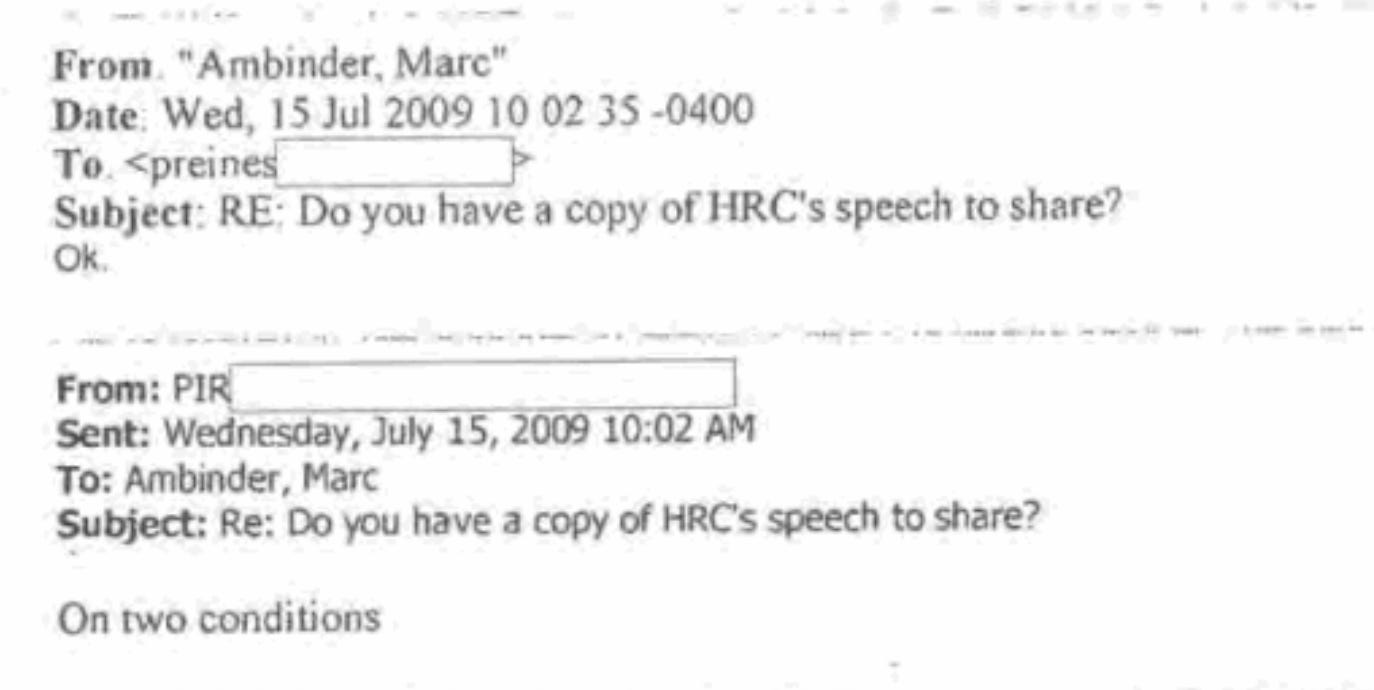
CBS
The State Department and White House indicated they had arranged with CBS News Face the Nation for Secretary of State John Kerry to be shielded from any questions about the Hillary Clinton email controversy. “Think we can get this done so [Kerry] is not asked about email,” the White House’s Jennifer Palmieri emails to State Department spokesman Jen Psaki on March 12, 2015. Despite the fact that Kerry’s appearance on Face the Nation happened two days after Clinton held her first press conference on the emails, he was not asked about the controversy. CBS News says there was no discussion about or agreement to limit questions.
CNBC
CNBC anchor and New York Times contributor John Harwood, who moderated a Republican presidential debate, appears to have offered, compliments, helpful thoughts and analyses to the Clinton campaign. Harwood also worked at the Wall Street Journal, NBC and CNN.
On Sept. 21, 2015, Harwood appears to have solicited editorial ideas from Clinton campaign chair John Podesta for Harwood’s upcoming interview with Republican presidential candidate Jeb Bush. Harwood asks Podesta: “what should I ask Jeb…in Speakeasy interview tomorrow?”
CNN
On April 28, 2016, a Democratic National Committee official indicates the DNC can supply CNN with questions to ask Republican presidential candidate Ted Cruz. In an email titled, “Cruz on CNN,” the DNC official emails DNC colleagues that “CNN is looking for questions. Please send some topical/interesting ones. Maybe a couple on Fiorina. Someone please take point and send them all together by 3pm. Thank you!”
In another exchange, the Clinton campaign emailed that CNN politics producer Dan Merica and Clinton were “basically courting each other.”
In an email, Democratic National Committee chair Donna Brazile (then a CNNcontributor) said she obtained an advance question for an upcoming CNN town hall with Hillary Clinton and Bernie Sanders, and she passed it on to the Hillary campaign. This would give Clinton an advantage in the televised event. Indeed, the question asked in the March 13 town hall. Brazile responded to the news by saying she didn’t do what her email said she’d done.
A second email revealed Brazile passed along to the Clinton campaign another advance question in advance of a CNN primary debate between Clinton and Sanders. “One of the questions directed to HRC tomorrow is from a woman with a rash. Her family has lead poison and she will ask what, if anything, will Hillary do as president to help the ppl of Flint,” Brazile wrote on March 5, 2016. On March 6, a woman fitting the description did ask a similar question.
CNN political commentator Maria Cardona emailed Democratic National Committee officials a draft of her opinion piece that attacked Bernie Sanders prior to the upcoming Democratic National Convention in Philadelphia. She invited the DNC’s editorial input and made changes accordingly, asking the DNC, “Is this better?”
The pro-Hillary Clinton super PAC American Bridge claimed it “placed” negative stories about Jeb Bush with CNN and other news outlets.
American Bridge also claimed that a report it produced against the conservative Koch Brothers (billionaire donors) resulted in “a high-profile CNN story.”
(See also Stelter under New York Times)
Daily Beast
Eleanor Clift of the Daily Beast appears to feel left out when she wasn’t invited to a Clinton campaign dinner for reporters as Hillary Clinton was launching her run for President. On April 10, 2015, she writes Clinton campaign chair John Podesta, “John, I completely understand why dinner at your home did not include someone like me, who’s a known quantity to Clinton campaign veterans. But I wanted to make an appeal for an early opportunity to get myself and the Daily Beast Political editor, Jackie Kucinich, on your radar so I/we can write and report knowledgeably. There’s a long campaign ahead, and I’d like to establish a line of communications. Is there an assistant I should go through? I look forward to working with you (and maybe getting some of that pasta and walnut sauce dish!!) All best, Eleanor”

Daily Kos
A source for the pro-Hillary Clinton propaganda and smear group Media Matters named Daily Kos one of several news outlets that are helpful in getting out the Media Matters agenda, according to Daily Caller.
Huffington Post
“The [Huffington Post] guys were good, Sam and Nico,” said a Media Matters source to Daily Caller, speaking of reporters who will report what Media Matters puts out. The comment apparently refers to Nico Pitney and Sam Stein.
Los Angeles Times
Ken Dilanian, who covered the CIA for the LA Times, explicitly promised positive news coverage and sometimes sent the CIA press office entire story drafts for review prior to publication, according to the Intercept, which obtained internal CIA emails and called Dilanian “the CIA’s mop-up man.” His approach apparently won approval from numerous left-leaning national news organizations who hired him including AP, USA Today, and NBC News, where he is currently a Justice and Intelligence Correspondent. His work is typically seen as biased in favor of the justice and intelligence communities he covers, andanti-Trump.
Jim Rainey of the LA Times “took a lot of our stuff,” a Media Matters source told Daily Caller.
MSNBC
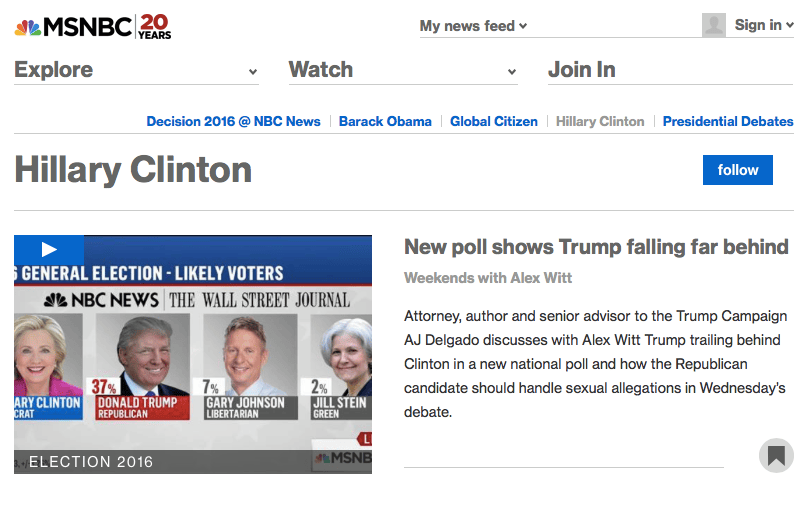
“Media Matters staff had the direct line of MSNBC president Phil Griffin, and used it,” a Media Matters source told Daily Caller. “If we published something [negative] about Fox in the morning, [MSNBC would] have it on the air that night verbatim. We were pretty much writing their prime time. But then, virtually all the mainstream media was using our stuff.”
Additionally, the Clinton campaign believed it could count on NBC’s Andrea Mitchell to conduct a helpful interview, upon its request, with Hillary Clinton amid the email controversy in 2015, according to WikiLeaks emails.
New York Times
New York Times reporter Scott Shane privately provided the State Department Public Affairs office with what appears to be an advance NYT story publication schedule regarding a major controversy surrounding Hillary Clinton’s State Department.
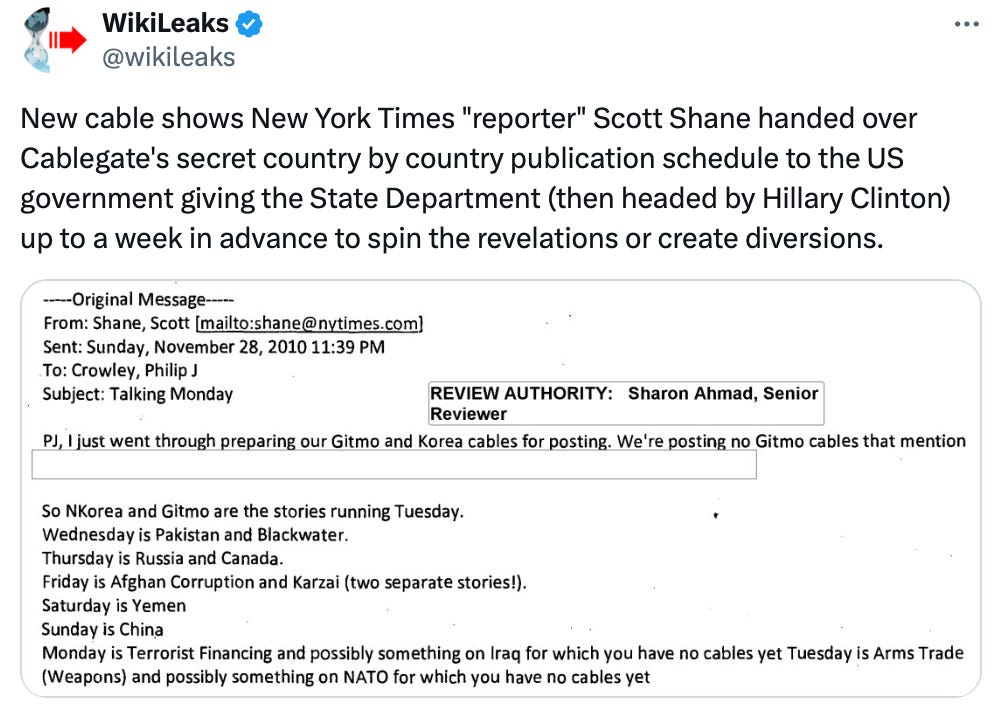
“Brian Stelter at the New York Times [later at CNN for several years] was helpful,” in publishing the Media Matters narrative, a source told Daily Caller. He was seen as consistently anti-Trump and on the chosen Media Matters narratives.
New York Times reporter Mark Leibovich (formerly of The Atlantic) gave Hillary Clinton the opportunity to approve or veto her quotes. He later explained that was because he agreed to make the original interview with her off-the-record and required her approval to use selected pieces of it.
The pro-Hillary Clinton super PAC American Bridge claimed it placed negative stories about Jeb Bush with the New York Times and other news outlets.
It’s unclear exactly how, but the Clinton campaign’s Jennifer Palmieri got an advance briefing about a soon-to-be-published New York Times story. She appears to have been involved in or at least got the chance to see different drafts of the story. She also indicated she had a direct line on the timing of publication.
“I got a briefing on the story, it’s in a much better place,” Palmieri writes on July 8, 2015 to Clinton and colleagues. “Takes the viewpoint that 20 years after [Bill Clinton] declared ‘the era of big government is over,’ HRC [Hillary Clinton] is putting forward more liberal agenda that would expand government’s role. It refers to HRC’s ‘policy ideas’ as opposed to ‘plans,’ notes she hasn’t rolled them out yet, and will do an economic speech on Monday. It says that if her ideas were enacted they would likely cost in the ‘hundreds of billions of dollars,’ does not put a number on it, which is good. There is a good bit in there about Bernie’s plans too, and how he would represent a bigger expansion of government and questions whether HRC’s agenda will be seen as progressive enough in comparison. It should post later tonight or tomorrow.”
Nov. 13, 2015 Clinton campaign press secretary Brian Fallon indicated the campaign had successfully planted a negative story about Sen. Charles Grassley in the New York Times, apparently with reporter Maggie Haberman. “After hitting a wall with other outlets, NYT will do a story about DiSanto. Adam Jentleson in reid’s office is giving a statement saying the connection is troubling and raises questions. Could pop this weekend,” Fallon emails another Clinton ally.
Three days later, the New York Times’ Haberman published the article questioning whether a State Department official (DiSanto) was improperly leaking damaging information to Grassley. Haberman was previously lauded as a cooperative journalist by Clintonites while working at Politico. At the Times, she became known for her biased reporting against President Trump.
(See also Haberman under Politico)
(See also Harwood under CNBC)
Politico
In April of 2015, Chief Politico political correspondent Glenn Thrush sent part of an article to Clinton campaign official Podesta for approval before it was published.
“Please don’t share or tell anyone I did this,” Thrush writes in the April 2015 exchange. “Because I have become a hack I will send u the whole section that pertains to u…Tell me if I fuc*ed up anything.”
Podesta signs off and the article is published.
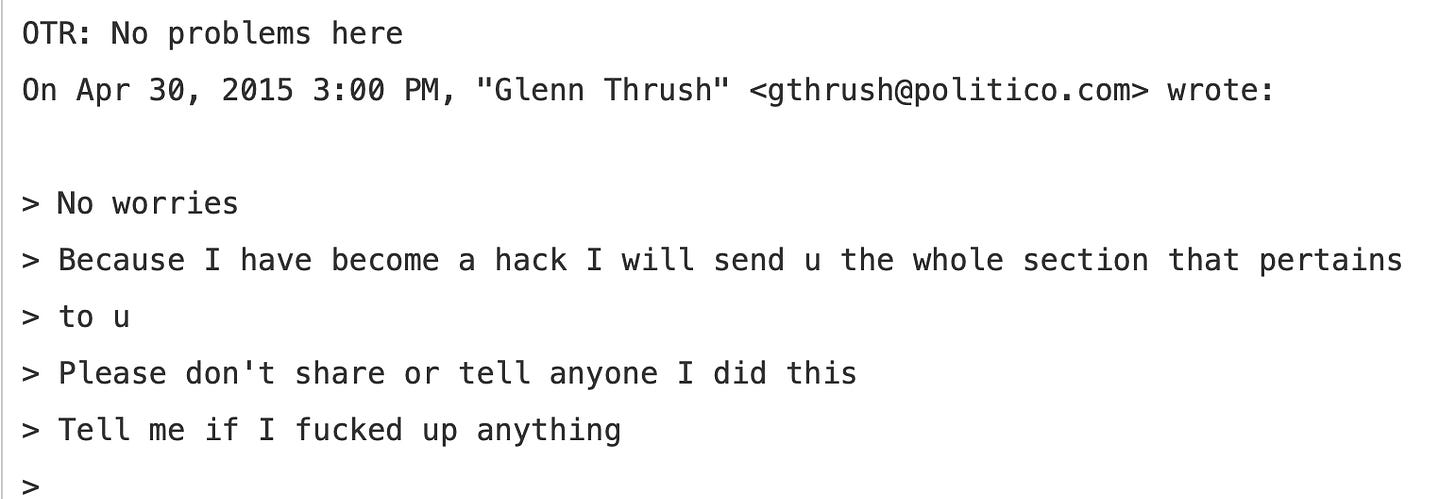
An email on April 17, 2015 shows Thrush also sent eight paragraphs from a pre-published article to Clinton Communications Director Jennifer Palmieri with the title “please read asap…don’t share.” Palmer writes colleagues, “Glenn Thrush is doing a story about how well launch went and some part of it will be about me – which I hate. He did me the courtesy of sending what he is going to say about me. Seems fine.”
The New York Times apparently approved of Thrush’s reporting style. It hired him, along with left-leaning Maggie Haberman, to negatively cover President Trump.
In 2017, Thrush was removed from his Times assignment amid sexual misconduct allegations. The Times ended up permanently removing him from the White House beat and suspending him, but eventually welcomed him back to cover the Justice Department.
Additionally, Staffers at Media Matters say they “knew they could dump stuff to Ben Smith” when he was at Politico, according to Daily Caller. “Ben Smith will take stories and write what you want him to write.” That type of reporting apparently set well with other left-leaning news organizations, as Smith went on to become editor-in-chief at Buzzfeed.com and then media columnist for the New York Times.
Politico chief investigative reporter Ken Vogel emailed a soon-to-be-published story to Democratic National Committee official Mark Paustenbach “per agreement” and invited his “thoughts.” Paustenbach gave the draft to the DNC’s head of communications, Luis Miranda. “Vogel gave me his story ahead of time/before it goes to his editors as long as I didn’t share it,” Paustenbach told Miranda.

In his effort to get an interview with Chelsea Clinton, Mike Allen, Politico’s chief political reporter offered to provide questions in advance, “precisely” agreed upon with a Hillary Clinton aide. “The interview would be ‘no-surprises’: I would work with you on topics, and would start with anything she wants to cover or make news on. Quicker than a network hit, and reaching an audience you care about with no risk,” Allen wrote the aide. After the email became public, Allen apologized and said he would never do what he offered to do in his email.
Hillary Clinton staffers described Maggie Haberman, then of Politico, as an ideal “friendly journalist” with whom to place stories. “We have had her tee up stories for us before and have never been disappointed,” writes one staffer in an email. As mentioned, Haberman went on to work for the New York Times where she became know for her biased coverage against President Trump. The emails were first reported in The Intercept.
Read the Intercept article by Glenn Greenwald and Lee Fang
PBS
The Clinton campaign apparently arranged for PBS to “put the news out” about the reversal of Clinton’s support for the Trans Pacific Partnership TPP trade deal in interview with Judy Woodruff on Oct. 7, 2015.
In an email exposed by WikiLeaks, the Clinton campaign implied it retained control over the timing of the PBS rollout, and planned a coincident paper release statement.
“I told PBS to hold till 345pm and that we would send the statement to our travelers after they put the news out (we should give them 15 minutes of breathing space),” writes the campaign’s Jennifer Palmieri. She notes, “We can move up PBS’ time if need be.” The time on the PBS online release is 3:44pm.
Salon
A Media Matters source told Daily Caller that left-leaning Salon proved to be a “helpful” news outlet for getting its message across.
San Francisco Chronicle
A Media Matters source told Daily Caller that Joe Garofoli at the Chronicle “took a lot of our stuff.”

Vox
The Clinton campaign indicated that it believed it could use Ezra Klein of the liberal blog Vox (formerly of the Washington Post) to further its narrative on Clinton’s email controversies in 2015, according to emails released by Wikileaks.
Klein went on to join the New York Times in 2020.
The Wall Street Journal
The pro-Hillary Clinton super PAC American Bridge claimed it placed negative stories about Jeb Bush with the Wall Street Journal and other news outlets.
The Washington Post
Dana Milbank of The Washington Post or somebody connected to an article he was planning apparently turned to the Democratic National Committee for negative research about Donald Trump. On April 21, 2016 a DNC official wrote colleagues, “research request: top 10 worst Trump quotes? Milbank doing a Passover-themed 10 plagues of Trump. Off top of my head, I’m thinking: · Punish women · Mexicans as rapists · Ban Muslims · Shoot someone in middle of 5th ave · Rough up BLM protestor · Anchor baby · Do a lot worse than waterboarding · Blood coming out of her wherever · Spill beans on ted’s wife · Talked about penis on stage at debate Any other big things I’m missing? And can you pull bullets for these?”
The resulting Milbank article entitled “The Ten Plagues of Trump” cited eight of the suggestions provided by the DNC.

Democratic National Committee officials discussed “placing” a story with the Washington Post’s Greg Sargent to put a positive spin on some bad news for Hillary Clinton.
The goal was “to make sure the first story out of the gate is as helpful as possible,” according to a DNC official. “But, the specific reporter is not as important as getting it to an outlet before the news breaks so we can help control the narrative on the front end. Otherwise this may likely get spun in a not-so-helpful way. We should also get Rep. [Elijah] Cummings on the phone with that reporter.” The email continues, “…can we please consider giving Sargent the first bite to get a good first story out there? Can I have him call you? We had been working him for weeks in general on writing up something positive, we think he’d play ball.”
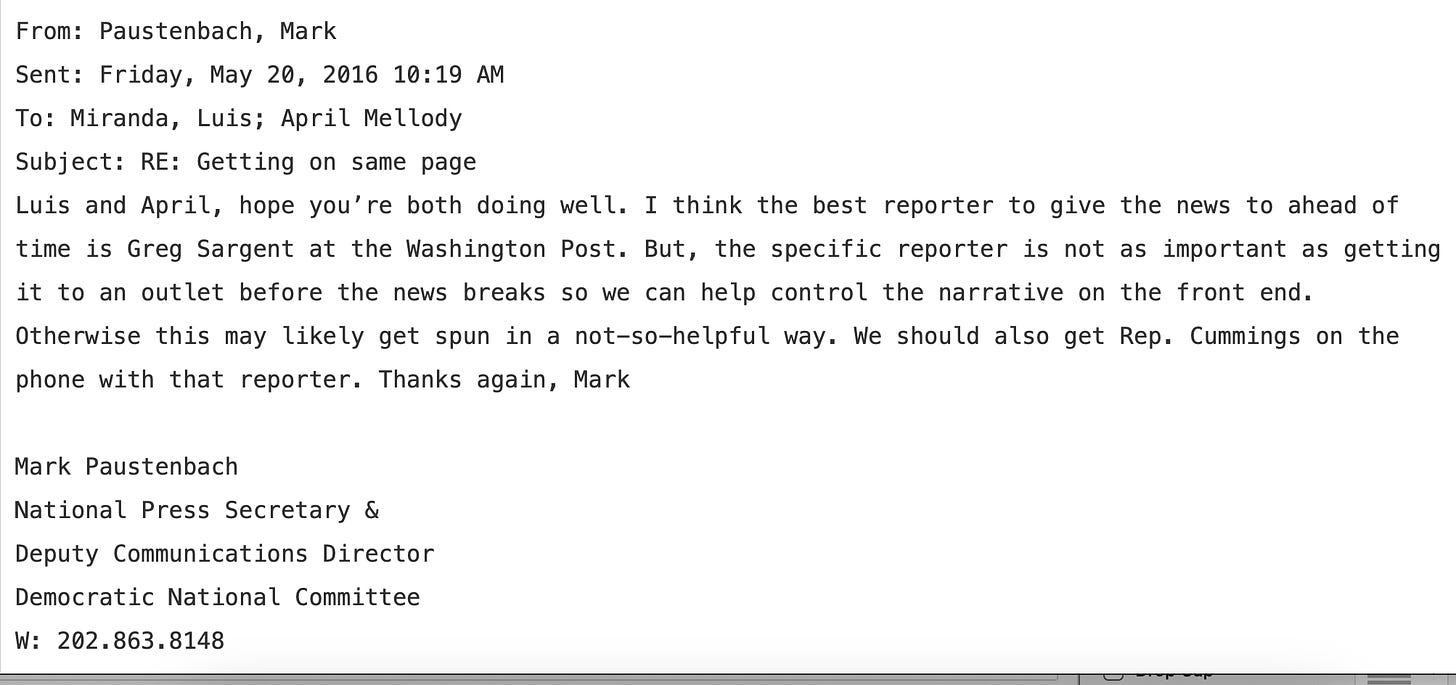
Staffers at Media Matters counted on the liberal Plum Line, Sargent’s Washington Post blog, according to a source who spoke to Daily Caller. “Greg Sargent will write anything you give him. He was the go-to guy to leak stuff,” claimed the source. “If you can’t get it anywhere else, Greg Sargent’s always game.”
“We’ve pushed stories to Eugene Robinson and E.J. Dionne [at the Washington Post],” the Media Matters source told Daily Caller.
The pro-Hillary Clinton super PAC American Bridge claimed it placed negative stories about Jeb Bush with the Washington Post and other news outlets.
Thank you for reading Sharyl’s Substack. This post is public so feel free to share it.
Revealing ‘Strategic Memos’
An additional window into how political interests, including super PACs, work to influence and manipulate the news is found in an internal Clinton campaign memo published on WikiLeaks in 2017.
In the memo, the Hillary Clinton super PAC “Correct The Record” boasts it had placed 21 “strategic memos” with the media that “led to stories in a number of news outlets including National Journal, Politico, USA Today, MSNBC and The Hill.” Correct The Record has joined other pro-Hillary Clinton groups founded by Clinton surrogate David Brock, including Media Matters and the American Bridge super PAC, in attacking Clinton’s opponents. Correct The Record’s targets have included Democrat Bernie Sanders and Republican Donald Trump.
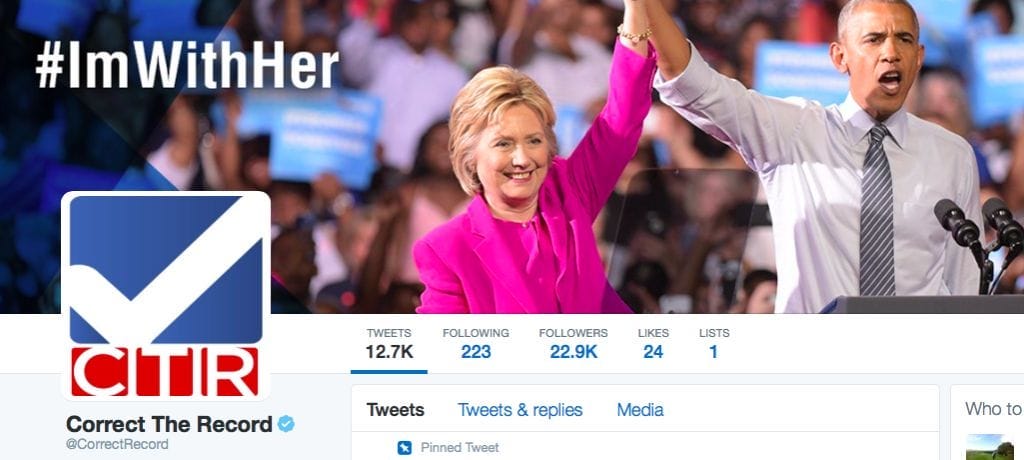
Correct The Record president Brad Woodhouse repeatedly appeared in news interviews during the 2016 campaign without the disclosure that he operates a Hillary Clinton super PAC that coordinates openly with the campaign, unlike any other super PAC.
Among other functions, the Correct The Record memo says it “arms more than 300 surrogates with facts and talking points to spread the message and the facts on cable and other news” and “deploy products targeted to specific audiences.”
One of the “products” is “pushback documents” distributed to “members of the media, key surrogates, pundits, opinion leaders” to refute “false information” about Clinton. The documents include “research analyses,” “talking points” and “blog-style posts made specifically for the web.” Other products are “media statements” and “positive media relations with Clinton beat reporters, producers and editors…Our communications team is constantly in touch with the media and provide, whether in our own voices or in the voices of surrogates, a constant stream of statements to the press on all things Clinton related. And because media relations isn’t just going on the record, some of our team’s most important work is killing bad stories before they ever get written.”
Under “Metrics,” the Correct The Record memo cites its mailing list of 960 members of the national media and 10,756 regional reporters in 28 states. It sends talking points and memos regularly to 369 televisions producers and bookers. It says its work has “impacted the framework for dialogue about 2016, Clinton, and her competitors.” The group says it has “engaged trusted names” to write opinion editorials for newspapers across the country. “Correct The Record has placed 132 op-eds nationally and in strategic local markets” and, since May 15, “helped write and place 36 op-eds across the country in a number of publications including Politico, Times Union, Huffington Post, CNN, Washington Blade, and New Jersey’s Bergen Record.”
Correct The Record also says it’s conducted “over 900 on-the-record and off-the-record media interviews” and “identified 372 surrogates including influential and frequent pundits on broadcast and cable news for Presidential 2016 politics and provided them around 80 sets of talking points, background materials and briefings on topical issues” to defend Clinton and her record.
American Bridge
More information on how super PACs influence the news media is found in an internal memo written by Brock’s pro-Hillary American Bridge super PAC. It was also published by WikiLeaks.
The opposition research group set up “war rooms” for the first time on site in states where its trackers were monitoring Republican candidates to “interact with reporters on site, and to cut and move footage more efficiently so we can break news before anyone else.” In other words, American Bridge uses its formidable resources to do one-sided investigative work and then peddles the product as “news” to reporters.
Apparently, the strategy works. The American Bridge memo said its on-site war room in Wisconsin collected negative clips about Senator Ron Johnson and got them covered by Talking Points Memo, the Milwaukee Journal-Sentinel, The Capital Times, The Hill, and Roll Call.
In the memo, American Bridge also bragged that CNN was receptive to its outreach. “CNN recently ran a feature story on our use of livestream technology.” Examples of the group’s rapid response efforts getting picked up by the press included “Jeb Bush’s comments on privatizing Social Security (June 2015), his comment that “all lives matter” (July 2015), Chris Christie jumping on Jeb Bush’s ‘work longer hours’ bandwagon (July 2015), and Rick Perry slamming Jeb’s economic growth record in Florida (July 2015).”
“Several of these were clipped, cut, and shared on social media and/or by press release while the candidates were still delivering the same speech,” read the American Bridge memo.
American Bridge said it “placed” negative stories about Bush with CNN, Washington Post, the Associated Press, the New York Times, the Wall Street Journal, and several key Florida outlets. “Our tracking operation has also been key in undermining Jeb through a constant barrage of rapid response attacks.”
One month after the 2014 midterm elections, American Bridge released a “primer” to “define the field before the prospective candidates could define themselves for the electorate.” The group took credit for successfully marketing a negative media narrative on Scott Walker, leading to his downfall. “We developed a powerful narrative of cronyism, outsourcing, and looking out for the interests of big business over middle class families, which undercut his economic message,” said the group’s memo. It also took credit for “forcing the Kochs [conservative billionaire donors]…out of the shadows” and said an American Bridge report against the Kochs resulted in “a high-profile CNN story.”


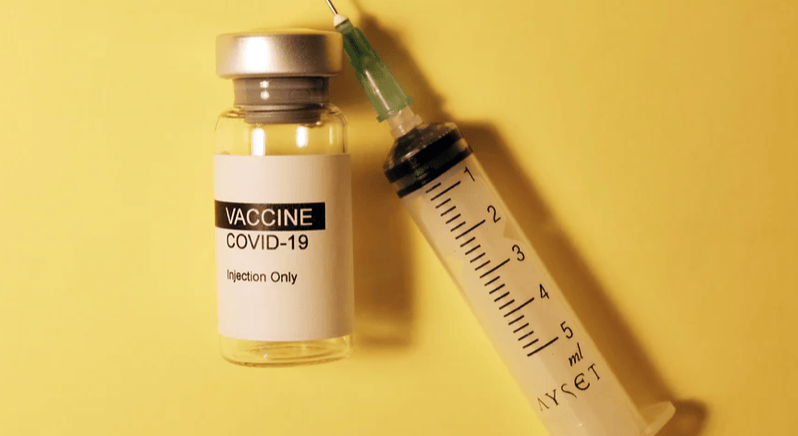

How often did Hilary Clinton push the claim Trump will not leave the WH.
That irrational but repeated trash talk primed the pump that turn the peaceful Trump rally into the eventual Jan 6 Clinton-goaded “insurrection.
Did that start with the media salting the media with Hilary Clinton’s bogus claim? Then all the very curious events never explained that staged the Capitol Police riot “insurrection”
Did Hillary Clinton convince Nancy Pelosi that Trump would use any additional National Guard presence on Jan 6 to …mount his now Hilary Clinton threatened …insurrection. So Nancy Pelosi finally turned additional troops down.
Scratch the surface of the “news” and one keeps finding Hilary Clinton. Or Nancy Pelosi.
Who killed Seth Rich?
Concerning Associated Press (AP): Though I don’t read Fox “News” articles much anymore since they shadow-banned me from the comment section when I had around 210,000 upvotes, one of the reasons I got shadow-banned was likely that I began pointing out the sentence that followed many Fox “News” articles, “The Associated Press contributed to this story.” My suggestion was that before reading any articles at Fox “News,” people should skip to the bottom and check to see whether it was actually an Associated Press story. Since being shadow-banned by Fox “News,” I now only comment at Fox Business, whose comment section is apparently administered by someone other than the entity that shadow-bans commentators at Fox “News.”
Concerning David Brock’s Correct the Record website: I would add to this article that it was that website that first revealed (I think the date was April 20th or 21st, 2016) that online trolls were being hired to counter Bernie Sanders’ trolls — aka Bernie Bros. If I recall correctly, the original budget published by Correct the Record was $1 million. But then the hiring of online trolls greatly expanded after Sanders was bought off to drop out and back Hillary, and the hired Hillary trolls turned their attention to fighting with pro-Trump people, NONE of whom (to my knowledge) were hired, but all appeared to be genuine Trump supporters (like me). What worked against Sanders supporters never worked against Trump supporters.
William Bayer,
Journalism Co-Opted by Marxian Deep
State—from Time of Marxian Abe Lincoln’s
Contrived War against Self-Government :
https://thecommonsenseshow.com/agenda-21-conspiracy-economics/newsgate-reporters-caught-coordinating-political-hacks
Re : Abe Lincoln’s
Marxian-/Rothschild-
Contrived War, against
Founders’/Framers’
Self- Government :
https://sharylattkisson.com/2023/11/poll-us-voters-support-netanyahu-and-reject-calls-for-ceasefire-in-gaza/#comment-177761
-Rick
JUNGIAN-INTP,
Please don’t pretend that you’re replying to me when your comment has ZERO to do with anything I posted.
If this comment section observed any rules, your comment would be deleted post haste.